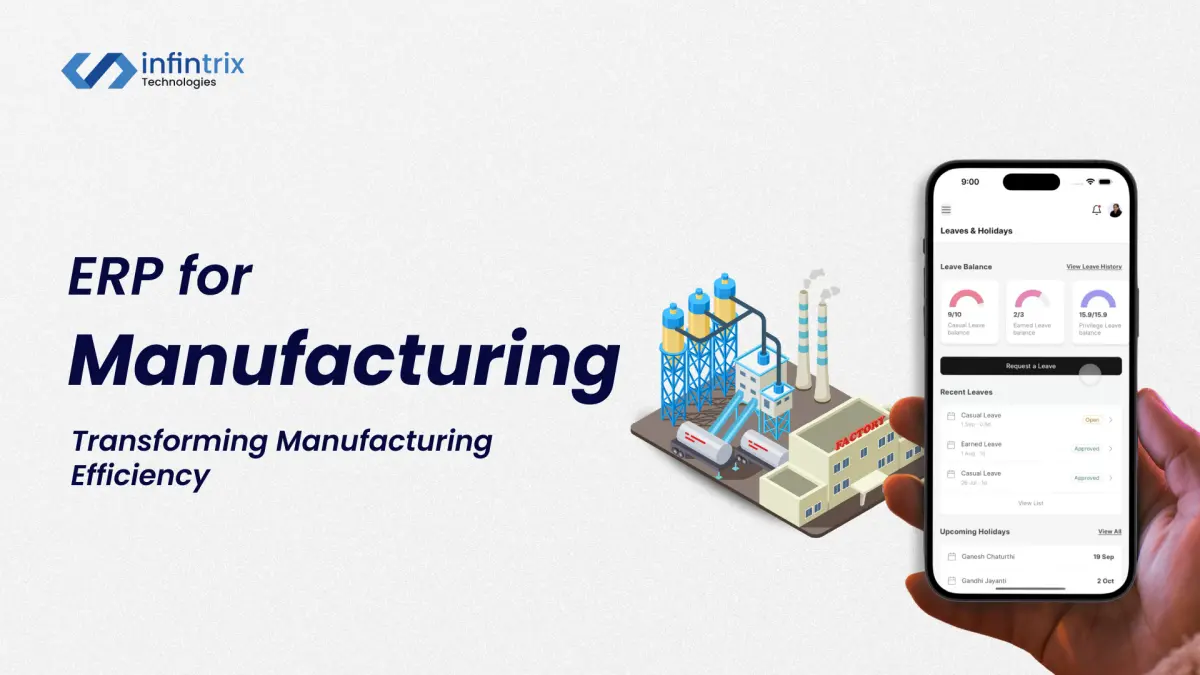The manufacturing industry is one of the fastest-growing sectors worldwide. To meet the diverse needs of manufacturing businesses, ERP offers a comprehensive, cloud-based ERP solution designed to streamline operations, enhance productivity, and drive innovation. Whether you run a small workshop or a large-scale factory, Simple ERP for manufacturing provides industry-specific tools to manage, track, automate, and collaborate across every stage of the manufacturing process.
Simple ERP empowers organizations to optimize workflows, reduce costs, and improve decision-making through advanced features like inventory management, production planning, and quality control. As a manufacturing software for small businesses, it supports various strategies like configure-to-order, make-to-order, and assemble-to-order, making it a versatile ERP system for small manufacturing businesses.
Key Benefits of Simple ERP for Manufacturers
- Streamlines Processes:
- Simplify complex processes and improve efficiency across various departments.
- Reduce Production Cost:
- Optimize resource utilization and minimize wastes.
- Enhance Data Security:
- Protect sensitive business information with robust security measures.
- Gain Production Oversights:
- Monitor every stage of production in real time.
- Improve Forecasting and Reporting:
- Make data-driven decisions with accurate insights.
- Optimize Cash Flow:
- Manage finances effectively with integrated accounting tools. build loyalty.
- Boost Operational Flexibility:
- Adapt quickly to changing market demands.
- Automate Workflows:
- Eliminate manual tasks and reduce errors.
Features of Simple ERP for Manufacturing
Simple ERP is a customizable, user-friendly solution that adapts to your unique business requirements. Here are some of its standout features:
1. Bill of Materials (BOM)
A Bill of Materials (BOM) is a detailed inventory of raw materials, assemblies, subassemblies, parts, and components—along with their required quantities—essential for manufacturing a product.
- Create, view, and print full product bills.
- Tailored item codes, quantities, costs, and descriptions.
- Define routing codes and operations for seamless production planning.
2. Shop Floor Management
Shop Floor Management enables real-time monitoring of workstation activities, task assignments, and production progress. It ensures smooth operations by tracking manufactured products, logging updates, and optimizing employee workflows for maximum efficiency.
- Monitor workstation locations and activities in real time.
- Track manufactured products and assign tasks to employees.
- Log production updates and ensure smooth operations.
3. Material Requirement Planning (MRP)
Material Requirements Planning (MRP) helps manufacturers calculate material needs, track inventory levels, and monitor production capacity. It automates stock valuation, reduces waste, and ensures timely procurement to meet production demands.
- Link material requests to base prices for accurate cost calculations.
- Track inventory levels and purchase records.
- Monitor production capacity and automate stock valuation.
4. Item Variants:
Item Variants allow manufacturers to manage products with different sizes, shapes, or colors. It automates SKU generation, simplifies stock requests, and ensures accurate tracking of variant-specific inventory.
- Monitor workstation locality and activities in real time.
- Track manufactured goods and assign tasks to employees.
- Log production updates and ensure smooth operations.
5. Subcontracting
Subcontracting simplifies collaboration with external suppliers and vendors. It ensures timely delivery of raw materials, prevents stock shortages, and tracks outsourced labor and services, enhancing overall production efficiency.
- Collaborate with multiple suppliers and vendors.
- Expedite raw material supplies and avoid stock shortages.
- Track labor and outsourced services efficiently.
6. Capacity Planning
Capacity Planning helps manufacturers work orders, tracks production online, and monitors online due dates. It ensures optimal resource utilization and timely delivery of products by overseeing functional operations and batch codes.
- Manual work orders and track due dates.
- Monitor production timelines and batch codes.
- Oversee functional operations and associated activities.
7. Quality Assurance
Quality Assurance ensures products meet predefined standards through testing parameters and quality control processes. It conducts incoming checks, manages item test relationships, and sends alerts for quality-related issues.
- Define quality control parameters and testing processes.
- Conduct incoming quality checks for raw materials.
- Set up alerts and notifications for quality-related issues.
8. Unit of Measurement (UoM)
Unit of Measurement (UoM) allows manufacturers to define multiple measurement units for products. It automates conversions for sales, purchases, and inventory, ensuring consistency and accuracy across transactions.
- Add multiple units of measure for products.
- Automatically convert UoM for sales, purchases, and inventory.
- Maintain detailed transaction histories for better traceability.
9. Stock Balance and Replenishment
Stock Balance and Replenishment forecasts inventory levels and sends alerts for low stock. It simplifies stock valuation, updates item details, and ensures accurate tracking of warehouse information.
- Forecast stock levels and receive alerts for low inventory.
- Simplify stock valuation and update item details on the dashboard.
- Display item codes, names, and warehouse information for easy tracking.
10. Inventory Control
Inventory Control optimizes stock management through forecasting, categorization, and tagging. It streamlines restocking requests, dispatch scheduling, and storage solutions, ensuring efficient inventory organization and control.
- Implement inventory forecasting and restocking strategies.
- Categorize and tag products for better organization.
- Schedule dispatches and manage storage solutions effectively.
11. Customization
Customization enables manufacturers to design tailored forms, reports, and workflows. With multilingual support and quick-entry options, it adapts to unique business needs, ensuring seamless operations and improved productivity.
- Design custom forms for bills, orders, and reports.
- Add multilingual support for global operations.
- Enable quick entries and manage change tracking effortlessly.
12. Batched and Serialized Inventory
Batched and Serialized Inventory organizes products into batches and assigns unique serial numbers for traceability. It supports barcode scanning, simplifies stock tracking, and ensures compliance with manufacturing and expiry dates.
- Automatically create batches and assign serial numbers.
- Split batches based on manufacturing or expiry dates.
- Use barcode scanning for quick product entries and tracking.
Why Choose ERP?
Simple ERP is a game-changer for manufacturers seeking to optimize production, reduce costs, and embrace automation, while also highlighting industry-specific advantages such as automotive ERP benefits for businesses in that sector. Its industry-specific features, such as MRP, shop floor management, and quality assurance, enable businesses to streamline workflows, improve decision-making, and achieve sustainable growth.
With Simple ERP, manufacturers can:
- Adapt the system to their unique needs.
- Maximize ROI through cost-effective solutions.
- Enhance operational efficiency and productivity.
- Stay ahead of the competition with innovative tools.
Conclusion:
ERP for Manufacturing is the infinite solution for manufacturers looking to revolutionize their operations. By integrating advanced features like inventory control, production planning, and quality management, it empowers businesses to overcome challenges, reduce costs, and deliver exceptional results.
With Infintrix ERP Solution, you can unlock the full potential of your manufacturing processes and achieve long-term success in a competitive market. Embrace innovation and efficiency with Simple ERP—your trusted partner in manufacturing excellence

